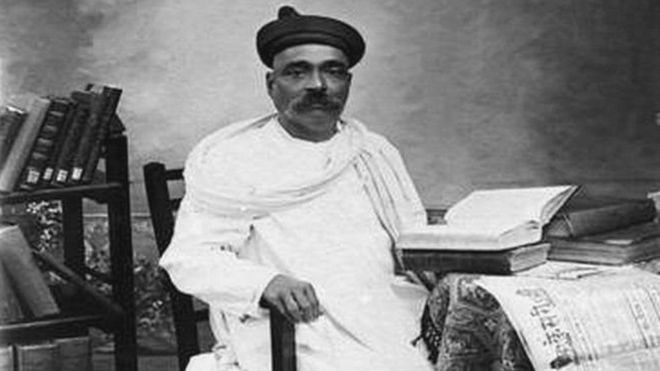To what extent was Tilak against the education of non-Brahmins and women?
Nation building is an inclusive process. Different people have to come together to build a strong country.
Mahadev Govind Ranade (1842-1901), a veteran intellectual of his time in Maharashtra, said that in a country like India, there should be four important pillars of nation building. For this, empowerment of farmers and women is important. Everyone should get education and revolutionary steps of social reform should be taken.
In 1942, while celebrating his birth anniversary, Bhim Rao Ambedkar said that ‘Ranade had a natural honesty. He had tremendous intellectual ability. He was not only a lawyer and a high court judge, but also a top-class economist. He was a top level economist, educationist and also a scholar of the same level.
When the founder of the Arya Samaj, Dayanand Saraswati reached Pune in 1875, a group of people threatened to kill him. At that time, Ranade and Jyotirao Phule came forward to protect themselves. Between the sticks of sticks and the barrage of stones, both took them safely from the streets of Pune.
As a senior judge after 1880, Ranade could neither openly support the initiatives of the Maharaja of Kolhapur (1901) nor any guidelines to the Indian National Congress (1885). Nor could he join the Deccan Sabha (1896) to negotiate with the government for tax exemption.
According to Deccan Sabha papers, he held meetings in his home. His supporters Gopal Krishna Gokhale, Vishnu Moreshwar Bhide, RG Bhandarkar, Gangaram Bhau Mashke and others put forward his ideas. Ranade and her supporters faced strong opposition from Bal Gangadhar Tilak (1856–1920).
Appreciation of Karl Marx, opposition to farmers and support of caste-system
Tilak’s career as a journalist began in 1881 with his three contradictory works.
First, he not only introduced Karl Marx’s ideas to the British press (1 May 1881) by publishing some old articles, but also praised them.
Secondly, he strongly criticized the law made for the relief of the farmers of Deccan, which came into force a few days ago. This law was meant to protect the poor peasants from the greedy usurers who used to grab their remaining assets and send them to jail for non-payment of debts.
Third, he defended the caste system.
These three issues remained pillars of his ideology throughout his life. In 1884 Mahadev Govind Ranade and some other reformists jointly opened the first high school for girls (Huzur Paga).
During that time a ‘bill of consent’ (regarding the age of marriage) also came. Tilak emerged as the antagonist of both of them.
Demand to send farmers to jail
‘The Mehratta’ was not a corporate newspaper. From 1881 to 1897, Tilak was the sole owner and editor of this newspaper. Till the last time of his life he kept editing it with NC Kelkar.
The draft ‘Deccan Agriculturalists’ Relief Bill’ for farmers was prepared by Mahadev Govind Ranade and William Wedderburn.
This bill was introduced to provide relief to the farmers who had suffered a severe famine between 1874-79. The situation at that time was that the debt of the moneylenders had increased from 1000 to 2000 rupees on the farmers who paid 10 to 20 rupees.
Under the famine and heavy debt, the peasants raised a huge revolt against the moneylenders. The movement was led by Vasudev Balwant, a Chitpavan Brahmin. The untouchables and tribals were supporting them. Untouchable and tribal leaders like Daulatiya Ramoshi, Babaji Chamhar, Sakharam Mahar and Kondu Mang were with Phadke.
But Tilak described the rebellion of the flurry as ‘an attempt of a misguided person’. (The Mahratta, 9 October 1881) The government arrested Phadke. He was prosecuted and sent to a prison in Aden and died there in 1883.
Further, for this, farmers do not have to be distressed in this way, for this, Ranade and Wedderburn proposed to set up agricultural (Shetkari) banks. These banks were to give loans to farmers at very low interest rates and flexible payment terms.
But Tilak also continuously opposed this law and proposed banks. He called the usurers ‘God of tenants’. He pleaded with the government that ‘For those who are not returning money from usurers, the law which sent them to jail should be implemented again’.
Education to the children of farmers, waste of money ‘
Due to heavy opposition from Tilak, the government finally stopped the decision to open these banks in 1885 and thus Tilak tasted the first taste of his victory.
Tilak’s attitude towards the farmers of Maharashtra lasted for a lifetime. In the famine of 1897, Gopal Krishna Gokhale and his Deccan Sabha, after successfully negotiating with the government, acquired some facilities for the farmers.
Gokhale was successful in increasing the wages of relief work during the famine. Along with this, he was able to get the farmers to apologize for the loan of Rs 48.2 lakh and stop the loan recovery of Rs 64.2 lakh.
But Tilak said that Deccan Sabha is a stables (Pinjarapol). He started a separate movement to keep the lands of Ryotbadi out of tax. Tilak demanded that the tax levied on the land of the moneylenders should also be exempted.
Tilak’s ‘anti-farmer’ was associated with his support of the caste system. Under his agenda of education, he continued to defend the caste-system.
Tilak said that ‘it is useless to teach children of Kunbis (farmers), to learn to read and write, and to know mathematics, geography have nothing to do with their practical life. Education and education will not harm them, only harm will be done.
He said, “Non-Brahmins should be taught carpentry, blacksmiths, Raj Mistry work and tailoring. This is the best work for their status.”
Tilak called it the ‘logical system of education’. In 1881, the Poona Sarvajanik Sabha demanded the government to open a school in every village with a population of 200 people. Tilak opposed it immediately.
He said that ‘educating the children of Kunbis is nothing but a waste of money’. Ranade used to emphasize education for all. But Tilak opposed this and said that ‘public money is collected from tax payers’ money. Only the tax payers have the right to decide how to use this money.
Never opposed english education
When Ranade tried to simplify the syllabus of the entrance exam to get more and more non-Brahmins enrolled in Bombay University, Tilak also opposed it.
Tilak never opposed English education. He used to say, “Before the introduction of English education in India, people here were herds of fools.”
Tilak wanted education to be limited to only Brahmins who had land. He was not in the right to teach even those Brahmins who were poor. There was a huge opposition to these ideas from non-Brahmins.
Therefore, in 1891, he started defending the caste-system. According to him, this is the basis of nation building.
He said, “It will be difficult for us to differentiate between the modern educated Brahmins and the educated non-Brahmins of the new age. It is time to realize this inequality.”
In one of his ‘sharp-edged’ editorials – Tilak wrote, “A Hindu nation believes that if it did not have the influence of caste, it would have been eradicated. Reformists like Ranade are killing caste and thus they They are also destroying the life force of the nation. “
Tilak rejected secular education. He said that it gives rise to ‘nihilism’. He used to emphasize that religious education imparted in schools should be given as its traditional orthodox and simple principles.
He wrote that ‘school children have to tell without any sense that God definitely exists, and the school children who say where God is, we want to see with our eyes, they have to be watered down .
Tilak used to emphasize the Home Rule League. He said, ‘The caste-system (Chaturvarna) is declining under British rule.’ He attacked the non-Brahmin administrator of Jamkhandi.
He criticized the Maharaja of Kolhapur, saying that he had lost his mental balance.
Tilak was against the schooling of girls
In order to defend the caste-system, he did not leave anyone. Sankeshwar’s Shankaracharya and even Adi Shankaracharya came under the attack.
Tilak also opposed women’s education with equal urgency. The school of Ranade opened for girls in Pune had implemented such a curriculum so that they could go further and pursue higher education. Ranade used to emphasize that education of women is very important for the overall development of a nation.
Maratha, Kunbi, Sonar, Judaism and converts to Christianity were also girls in this school of Ranade. Many of these were also girls from alleged untouchable families. To this Tilak said, ‘English education deprives women of femininity, after achieving this they cannot live a happy worldly life.’
He was very stressed on that women should be taught only in native languages, moral science and tailoring.
They also opposed girls studying in schools from 11 am to 5 pm.
They wanted the girls to be taught only three hours in the morning or evening so that they would have time to do household chores and learn.
Tilak cautioned Ranade that ‘if this course is not improved immediately, we should not be surprised to see why the number of girls like Rakmabai leaving husbands is increasing’.
The first woman to legally divorce in India
In fact, Rakmabai was educated and refused to live with her ill-fated husband, Grandpa Bhikaji. Rakmabai was always scared of the possibility of beating her up. So he refused to live with her husband.
Tilak had made it a question of the nose of the entire Hindu race. He supported Dadaji by filling the entire six pages in the eight pages of his weekly newspaper.
He wrote, ‘If Rakmabai refuses to go with her husband, then she should be sent to jail.’ He continued to insist that women like Rakmabai and Saraswati Bai (Pandita Ramabai) should be punished in the same way as thieves, adulterers and murderers. (The Mahratta, 12 June 1887)
Rakmabai’s case was also related to the ‘age of consent’ controversy as she was married in childhood. Actually, this debate arose with BM Malabari’s proposal that the marriage age of girls be increased from 10 years to 12 years.
Tilak also attacked GG Agarkar, Mahadev Govind Ranade and other reformist leaders in this matter. What Tilak wrote in this case cannot be quoted here in terms of decency.
Actually this debate was intensified with the death of 10-year-old girl Phoolmani. In 1890, Phoolmani died when her 30-year-old husband Hari Maiti was making physical relations with her.
Tilak appealed to the people that ‘Maiti has already lost her wife, do not be damned anymore.’ This tragedy united every section of the society and in 1891 the ‘Age of Consent’ bill was passed.
Tilak became a national personality after 1900. But did his attitude change? There is no evidence of this.
Tilak always criticized the colonial government for the reason that ‘because of them, the peasants were freed from the zamindars and usurers’.
He vigorously defended the landlords like Inamdar and Khote. Tilak always opposed efforts to strengthen the farmers.
When D.K. When Karve founded the Women’s University in 1915, Tilak said, “We should see an average Hindu girl as a daughter-in-law who has special duties towards the people of her husband’s house.” He told Karve to ‘limit the university curriculum to subjects like cooking, home economics and child care’.
Through his newspaper ‘The Mehratta’ and his supporters in the municipality, Tilak opposed free and compulsory education for girls.
Marxist historians made Tilak a hero
Throughout this period of his attacks on reformists and the progressive steps taking place in Indian society, Tilak had a very close relationship with the Indian members of the Communist Party in Britain.
Tilak supported Lenin and the Russian Revolution. Soviet and Indian Marxist historians consider Tilak as the greatest leader of the Indian freedom struggle.
These Ranade, Gokhale and dismiss the real leaders who created an inclusive India as ‘liberals’.
He deliberately forgot Ranade. Along with this, he forgot the campaigns launched in support of Tilak’s farmers, anti-women and caste. These historians only remembered his going to jail and being involved in the 1908 textile mill strike.
Today, even a century later, the completely ruined farmers in Maharashtra are committing suicide. The caste conflict is at its peak and women become victims of mass discrimination.
Tilak got a vibrant Maharashtra in 1880. In 1920, he left it completely divided and it is not right to blame colonial rule for this excess of Tilak.




